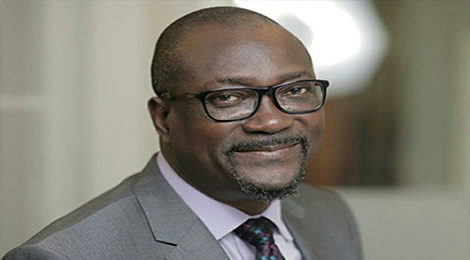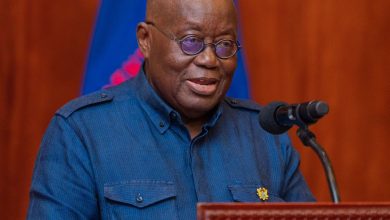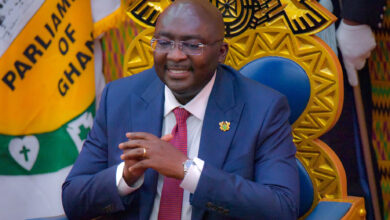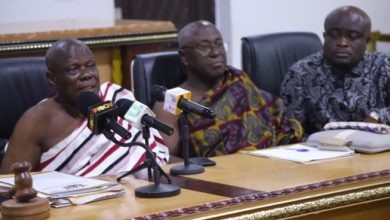SC ruling on Deputy Speakers: Constitutionally correct decision, says CDD boss

Professor Henry Kwasi Prempeh, the executive director of the Ghana Center for Democratic Development (CDD-Ghana) has defended the Supreme Court’s ruling upholding the right of Deputy Speakers of Parliament to vote.
According to Prof Prempeh, it is “a constitutionally correct decision, no matter what one might feel about the outcome politically.”
He said, “The authority and dignity of the Speaker’s office in the conduct of the business of the House is worth preserving.”
“All in all, a correct constitutional decision, albeit politically messy and unpleasant within the context of the circumstances of the 8th Parliament. Still, not such a big deal. Let’s move on,” he said in a Facebook post.
I am a huge advocate of a strong Parliament as a counterweight to our imperial Executive. That is why I find practices like Government appointing MPs to boards of state enterprises and regulatory bodies repugnant. This case involving the voting rights of a presiding Deputy Speaker is, however, not about Executive-Parliament relations. It is about how the business of the House must be conducted, having regard to the Constitution. In that regard, it is also implicitly about the appropriate balance of power between the Court (as ultimate arbiter of constitutionality) and Parliament (as master of its own rules).I have read the published judgement of the Supreme Court in Abdulai v Attorney-General. As the matter involved or implicated directly certain rules of the House and ruling of the Speaker, I was expecting to see more than just a private plaintiff and the Attorney-General as the parties represented in this case. Specifically, I had expected to see separate representation of the Speaker in this case. Anyway, we shall save that discussion for another day. Having read the Court’s judgement, it is, in my “not-so-humble opinion”, to borrow the words of my good pal Amos, a simple, straightforward, clear, and correct decision as a matter of constitutional interpretation and analysis. The Court’s judgement is faithful to the text and structure of the Constitution, as it is to the discernible intent behind the relevant provisions, as well as in harmony with sound reason and comparative practice in parliamentary democracies. Moreover, it is devoid of any trace of judicial activism and avoids needless detour into a brand of “purposive interpretation” that is unwarranted. This is not a case of judges displacing what the constitution says and substituting that with their own preferences; it is a case of the court sticking to the text and meaning of the constitution and giving due primacy to the fundamental principle of equal representation (voting rights) in a democratic legislature. And no, the Court’s judgement or interpretive approach in this case cannot be called literal. The Court’s interpretation is appropriately textual; it is no’t literal. Textualism is not the same as literalism. Textual interpretation includes, where the text doesn’t resolve the matter plainly or literally, employing legitimate tools and canons of interpretation to tease out the purposes and meaning behind the text. That’s what the Court did in this case. And that is all it needed to do to resolve the matter. In short, this is a constitutionally correct decision, no matter what one might feel about the outcome politically. First, it is important to state that, the longevity of a practice does not cloak that practice with constitutionality. No matter how longstanding a practice, its constitutionality cannot be established or presumed until and unless it is challenged in an appropriate constitutional case. Thus, the fact that this is how Parliament has done its business all this while is not a good enough argument, constitutionally speaking. Constitutions are not self-reinforcing. Until the Court’s jurisdiction to interpret, apply and enforce specific provisions of the constitution has been properly invoked in a particular dispute, the constitution will continue to lie dormant in the face of an unconstitutional act or practice. Second, I think that in this particular case, we exaggerate the powers of a presiding Deputy Speaker when it comes to voting in Parliament. Like the Speaker, a presiding Deputy Speaker cannot disenfranchise any MP. If you believe, for example, that a presiding Deputy Speaker has not called a voice vote correctly, you can call for a proper count. Presiding does not, in and of itself, present much of a conflict of interest to cause a Deputy Speaker to forfeit their vote, especially if he or she were to be required by House rules to vote last or cast a vote only when there’s a tie. Moreover, what compensating privilege or benefit does a Deputy Speaker (or his constituents) get when he presides over a House proceeding to justify causing him to (want to) give up his vote entirely on that occasion? Were we to require presiding members to forfeit their right to vote, we would encounter many instances where no member would want to preside over a House proceeding in the Speaker’s absence, particularly where a close vote was at stake.Third, if we do not want presiding Deputy Speakers to vote, the solution is simple: Don’t let them be MPs. Make them like the Speaker; not an MP and, therefore, not entitled to vote. The Speaker does not vote, not because he presides over proceedings of the House; he does not vote because he is not a Member of Parliament. So long as presiding Deputy Speakers are, first and foremost, MPs elected to represent communities of voters in Parliament, Parliament cannot reasonably deprive them (and, for that matter, their constituents) of their right to vote merely by virtue of the fact of presiding over a sitting of Parliament. Indeed, the inherent right of an MP to vote is too deeply fundamental that to cause any MP, including a presiding member, to forfeit it would require an express constitutional provision of the kind found in article 104(5). An MP’s fundamental right to vote, which is the very essence of representation in a democratic legislative assembly, cannot be defeated or overriden by mere implication or argumentation. The burden thus rests with those who would like to cause a presiding member to forfeit his or her inherent right to vote to show which constitutional text prescribes or compels that result. In any case, there’s nothing really wrong with both Deputy Speakers being MPs and retaining their vote when they preside. This is why we must take the Constitution seriously when it says that the 1st and 2nd Deputy Speakers must come from different parties. That way, the rival parties in Parliament will each have one Deputy Speaker and both of them get to vote when one presides.Regretably, this sensible “bipartisan” arrangement has not been followed in good faith in the 8th Parliament. We currently have two Deputy Speakers, both of whom are, de facto, from the same side of the partisan divide in Parliament. That is part of the politics surrounding this case. Na who cause am? Just because the candidate of the Minority prevailed over the candidate of Government in the contest for Speaker of this 8th Parliament did not require the Minority to cede the 2nd Deputy Speakership to an MP who was going to caucus with the Majority. If Majority and Minority had one Deputy Speaker each, as the Constitution, properly read, contemplates in a two-party Parliament, we might be spared some of the heat in this debate.Lastly, what is also fuelling the disputation over this case is the fact that the Speaker and the 1st Deputy Speaker had different interpretations or positions on the quorum and voting rules, and now the Court has weighed in on the side of the 1st Deputy Speaker. Surely not an outcome that makes for good rapport between Speaker and 1st Deputy. With that in mind, I would have given Parliament, and for that matter the Speaker, the opportunity to apply the House’s own internal procedures (Standing Orders) to cause the Speaker to reconsider and correct its earlier ruling or position on this question in accordance with the Court’s decision on the merits. Seems trivial or just a matter of form and appearance over substance, yes, but in these matters, form and appearances matter. The authority and dignity of the Speaker’s office in the conduct of the business of the House is worth preserving. All in all, a correct constitutional decision, albeit politically messy and unpleasant within the context of the circumstances of the 8th Parliament. Still, not such a big deal. Let’s move on.
Last week, a seven-member Supreme Court panel, presided over by Justice Jones Victor Mawulorm Dotse, by unanimous decision declared that the two Deputy Speakers of Parliament remain Members of Parliament when they are presiding and that they can vote and be counted as present for purposes of decision-making in the House.
The Supreme Court ruled that Order 109 (3) of the Standing Orders of Parliament, which state that “a Deputy Speaker or any other member presiding shall not retain his original vote while presiding”, is unconstitutional and same is struck out as unconstitutional.
However, the Minority Leader in Parliament, Haruna Iddrisu, has described the Supreme Court’s declaration that the two Deputy Speakers of Parliament can vote while presiding as a travesty of justice relating to parliamentary practice.
But Prof Prempeh said “the longevity of a practice does not cloak that practice with constitutionality.”
“No matter how longstanding a practice, its constitutionality cannot be established or presumed until and unless it is challenged in an appropriate constitutional case. Thus, the fact that this is how Parliament has done its business all this while is not a good enough argument, constitutionally speaking.”
Prof Prempeh also believes that the influence of Deputy Speakers has been overestimated in the ongoing controversy.
“Presiding does not, in and of itself, present much of a conflict of interest to cause a Deputy Speaker to forfeit their vote, especially if he or she were to be required by House rules to vote last or cast a vote; only when there’s a tie.”
He said “if we do not want presiding Deputy Speakers to vote, the solution is simple: Don’t let them be MPs. Make them like the Speaker; not an MP and, therefore, not entitled to vote.”
“As long as presiding Deputy Speakers are, first and foremost, MPs elected to represent communities of voters in Parliament, Parliament cannot reasonably deprive them of their right to vote merely by virtue of the fact of presiding over a sitting of Parliament,” he added.
Background
Justice Abdulai, a law lecturer at the University of Professional Studies, Accra (UPSA), instituted an action at the Supreme Court seeking a declaration that it was unconstitutional for the First Deputy Speaker of Parliament, Joseph Osei-Owusu, to have counted himself for the purpose of making up the quorum of half of the Members of Parliament (MPs), required by Article 104 (1), when Parliament approved the 2022 Budget Statement and Economic Policy of Government on 30 November 2021.
In his statement of case, the plaintiff further contended that: “To the extent that the Deputy Speaker cannot be counted, the decision taken on 30 November 2021 to approve the 2022 Budget was a nullity.”
Reliefs sought
According to the plaintiff’s statement of case, he was seeking a declaration that, “upon a true and proper interpretation of Articles 102 and 104(1) of the 1992 constitution, a Speaker or any other person presiding over Parliament cannot be said to be part of the members present for the purposes of decision-making”.
He also demanded a declaration that, upon a true and proper interpretation of Articles 102 and 104(1), the First and Second Deputy Speakers, when presiding over Parliament, have the same authority as the Speaker of Parliament and can therefore not be counted as MPs present for the purposes of taking a decision in accordance with Article 104(1) of the 1992 constitution.
Consequently, he claimed a declaration that the decision to approve the 2022 Budget, taken on 30 November 2021, amounted to a nullity and was of no effect.
AG’s rebuttal
The Attorney General, in his statement of case opposing the arguments of the law lecturer, argued that a Deputy Speaker of Parliament, or any member presiding over proceedings in the House in the absence of the Speaker, is entitled to be counted for the purpose of making up the quorum of half of the MPs required by Article 104 (1) of the constitution for determination of matters in Parliament.
He said further that a Deputy Speaker or any member presiding over proceedings in the House in the absence of the Speaker is entitled to cast a vote for the purpose of taking a decision in the House in accordance with Article 104(1) of the constitution.
The AG argued that the view espoused by plaintiff suffered from a fundamental failure to distinguish between a “Speaker qua Speaker under the constitution” and a “Member of Parliament who deputises for the Speaker” by virtue of Articles 96 and 101.
The Attorney General submitted further that the plaintiff relied on a very narrow, literal and absurd construction of Articles 96, 101, 102 and 104 of the constitution, thereby failing to take account of the different kinds of quorums required for the different “businesses” of Parliament and the rationale therefore, which supports the AG’s view that, in so far as decision-making in Parliament is concerned, all Members of Parliament including a Deputy Speaker when presiding, are entitled to vote.
Kinds of quorum
On the different kinds of quorum established by the 1992 constitution, Dame submitted: “It is clear from Article 102 that, for the ordinary business of Parliament, there must be a quorum of only one-third of all the Members of Parliament.
“Given that Parliament presently is made up of 275 members, the quorum required for the conduct of its business is 92 MPs. On the clear wording of the provision, the person presiding is not counted as part of the quorum.”
The AG then invited the court to take particular account of the words “person presiding” in Article 102, and held that, “When the constitution deliberately meant to specifically exclude a Deputy Speaker or any person who at a material point in time is performing the role of Speaker, from being included in the reckoning of any number for any purpose in Parliament, it said so in unambiguous terms.”
Articles 102 & 104
Dame submitted further that Article 102 is not the only provision of the Constitution on “quorum”, and that, Article 104 is on the “voting procedure” in Parliament.
“The provision provides for the manner in which a decision on a matter is generally determined to have been made on a matter,” he said, adding “this is set at a majority of members present and voting.”
The AG said, “Article 104 further, specifically provides for the number of Members of Parliament who must be present before a decision is made. This is set at, at least half of all the Members of Parliament. For the current composition of Parliament, that number clearly must be 138.
Thus, for the purposes of Article 104, i.e. taking a decision on any matter in Parliament, at least 138 members of all the Members of Parliament must be present and out of this number, a majority must have voted on the issue. Any other construction, will manifestly do unwarranted violence to the clear words of Article 104(1).”
Number required
The Attorney General submitted that, unlike Article 102, Article 104(1) does not make reference to the exclusion of the person presiding or any MP in the reckoning of either the number required before a matter may be determined in Parliament, or the number required for the actual determination of a matter.
“The obvious implication is that all Members of Parliament – including the Deputy Speakers, who are also, first and foremost, Members of Parliament – are to be counted among the 138 members, which is half of the 275 elected members required, before a question may be put on an issue or decision may be made on a matter,” Dame said.
“Further, the Deputy Speakers, who are also Members of Parliament, are not barred by any word in Article 104 from voting on an issue, whether presiding over proceedings or not,” he further submitted.
Persons specifically excluded
Dame submitted that a close examination of Article 104 discloses that the individuals who are specifically excluded from voting in parliamentary proceedings are explicitly mentioned in that provision.
According to him, only two people are prohibited from participating in any vote in the House, saying, “The first person is, as Article 104(2) indicates, the Speaker of Parliament.”
The AG contended that, “Article 104(2) should be properly construed to mean the Speaker qua Speaker, and not any other person who, for the time being or on temporary basis, presides over the House but who has not been duly selected to be Speaker.”
He said the second class of persons Article 104 prohibits from exercising the right to vote is stipulated in Clause 5 of Article 104. This, Dame said, is “a member who is a party to or a partner in a firm which is a party to a contract with the government [who] shall declare his interest and shall not vote on any question relating to the contract. Apart from these, no other Member of Parliament is prohibited from voting on an issue in Parliament.”
In the AG’s view, the decision to exclude or bar a Member of Parliament who is duly elected as such, and who represents a whole constituency in Ghana, from voting on a matter has such far-reaching constitutional implications that if the constitution had intended to have such effect, it ought to have said so expressly.
He argued furthermore that the constitution ought to be interpreted to achieve such effect only if specific mention is made in the constitution.
Other jurisdictions
Dame asserted that the interpretation he urged on the court in relation to Article 104 – namely, to permit a Deputy Speaker to be counted as part of the quorum for reaching a decision on a matter in Parliament, and to permit him to exercise his/her right to vote – is consistent with the practice in other jurisdictions.
He cited examples from other countries in Africa as well as other parts of the world, including the United States of America and Australia, to support his position.





